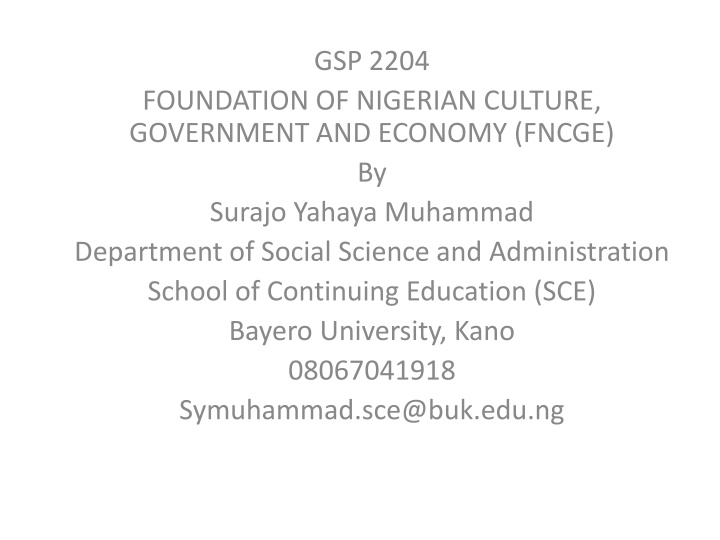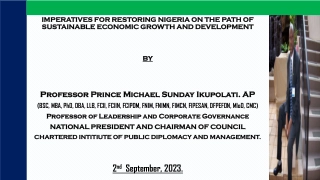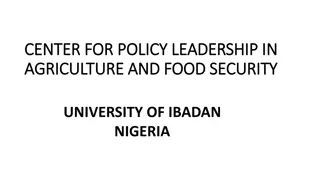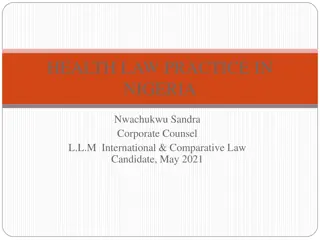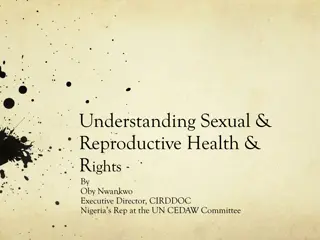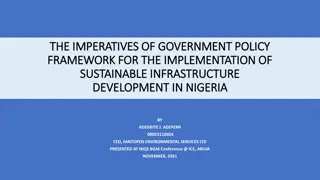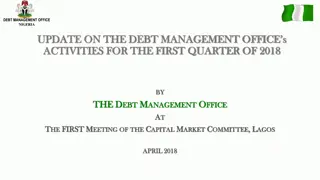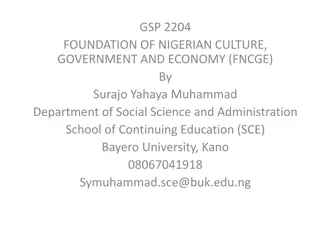Precolonial Administration in Nigeria: A Historical Analysis
Nigeria's precolonial administration was characterized by diverse kingdoms and empires with unique social structures and governance systems. The Hausa/Fulani society, for example, had a centralized political system organized around city-states, while other societies operated with decentralized power structures. Different roles such as Emir, Waziri, and Madaki were crucial in the Hausa/Fulani governance. The historical context sheds light on the rich cultural and political tapestry of Nigeria before colonial rule.
Download Presentation

Please find below an Image/Link to download the presentation.
The content on the website is provided AS IS for your information and personal use only. It may not be sold, licensed, or shared on other websites without obtaining consent from the author.If you encounter any issues during the download, it is possible that the publisher has removed the file from their server.
You are allowed to download the files provided on this website for personal or commercial use, subject to the condition that they are used lawfully. All files are the property of their respective owners.
The content on the website is provided AS IS for your information and personal use only. It may not be sold, licensed, or shared on other websites without obtaining consent from the author.
E N D
Presentation Transcript
GSP 2204 FOUNDATION OF NIGERIAN CULTURE, GOVERNMENT AND ECONOMY (FNCGE) By Surajo Yahaya Muhammad Department of Social Science and Administration School of Continuing Education (SCE) Bayero University, Kano 08067041918 Symuhammad.sce@buk.edu.ng
PRECOLONIAL ADMINISTRATION IN NIGERIA Prior to colonial administration, Nigeria was inhabited by various people, speaking different languages and with varied customs, values and tradition. The people were under the administration of large and small kingdoms and empires. Although, the people relate with one another long time before colonial administration but they were never control by one political leadership. Historically, there were trade relationship wars, peace treaties among the large, small empires and kingdoms. These empires and kingdoms consisted of different people and religions played a significant role in the political and economic life of the people. According to Gibbs (1965), there are three different entities found within the area of what is today known Nigeria before the coming of colonial administration, and each of these entities had their own different social organization from one another.
The Political System of Hausa/Fulani Pre-colonial society (Centralized System) For many years before the sheik Bin Fodio Jihad, the Hausa/Fulani society were organized in to seven different city states and they all had (Sarauta) that was hierarchical and centralized in nature. According to Fagge and Alabi (2017) the pre-Jihad Sarauta system was for all intent and purposes, semi-feudal. For one thing the system had a very strong hierarchical, pyramidal and hereditary bureaucracy from where decision trickled down. For another, it had social stratification based on occupation. This shows that, apart from the distinction between the aristocratsand the commoners (Talakawa) in the society, there was also social stratification among the commoners based on their occupation. Apart from the Hausa/Fulani society, there were other societies that were characterized by specialized institutions of government, operated by the state refer to as the absolute monarchies and the state had hierarchical bureaucracies and hereditary system of succession. For example, the KanemBorno Empire, Benin Kingdom, Nupe, Jukun, Igala among others.
In the Hausa/Fulani Pre-colonial Administration, the Emir (Sarki) being the head, formed an advisory council with their duties as follows; Waziri who act as the Prime Minister Madaki commander of the army Galadima who is in charge of capital territory SarkinFada Who is the head of place workers Ma aji in charge of treasury SarkinFawa Who is in charge of butcher SarkinRuwa In charge of fishing festival SarkinYari In charge of prison
A cephalous System (Decentralized System) These are societies in which power was decentralized and political and administrative system was carried out by different groups, such as descent groups, status or occupational group. Such arrangement could be found in the communities of Igbo, Tiv, Ibibio and Ijaw etc. The Igbo is the largest and heterogeneous ethnic group in the south-eastern part of region. They had different languages and also living in a far distanced areas and villages that were independent from one another. According to Forde and Jones (1950) cited in Fagge and Alabi (2017) the Igbo have a common culture which is described as Ultra-democratic and highly individualistic arising from this common culture, all Igbo communities had a traditional political system that was more or less identical. Unlike the Hausa/Fulani, the Igbo has a complex system of administration prior to the coming of colonial administration. There was no central power vested in the hand of one person. division of political authority into different groups, as follows; The village elders: these are group of people found in the Igbo community who handle any matter regarding their traditions and customs. The Age grade: who plays the role of maintaining peace, order, sanitations of the community. The Ozo title: this is a title given to the rich people due to their spending and contributions during ceremonies. The Ofo title: is the title given to the head of family. Rather, there was a
Based on these, power is not centralized in the Igbo pre-colonial administration. Hence, the factors that unite the Igbo community are; Common language, despite some variation in the language but they understand themselves. Oracle is a strong believe in the Igbo community Supreme God which is called Chineke. The Yoruba Political System (Semi-centralized System) The Yoruba pre-colonial administration had a limited monarchy and a mixture of some elements of Hausa/Fulani and Igbo system of administration which curtailed the powers of the state. The Old Oyo Empire was one of the Empires that existed before the coming of British colonial admiration situated in the south-western part of what is today known as Nigeria. It has a semi centralized system with Alafin (King) as the Chief executive; there was also a seven (7) men council of King Makers known as Oyemesi that was headed by Bashorun. It was the duty of the king Makers to appoint the Alafin (King) and also to serve as a check to his excesses. This Council had the power to remove King from office. Another council that was very important in the politics, government and administration of the Old Oyo Empire was the Ogboni cult which serves as a check to the activities of both the Alafin and the Oyemesi. In the Old Oyo Empire, there was also the army organization which was headed by the Army general called Aare- Ona-Kakanfo, and if he is defeated in war he must commit suicide or go to an exile.
The process of Colonial Administration in Nigeria The European societies came to African with the claim of exploring the shores of the continent, they also claimed to be missionaries as well as traders to market their products and to purchase raw materials, but they invariably colonized the people of Africa.and Nigeria was colonized by Britain. According to Timothy (1997) prior to 1807 and indeed as far back as the 15thcentury, the West and East coast of Africa were not unknown to Portuguese traders. But it was after the abolition of slavery that they in competition with other European power like Britain, Germany, and French engaged in legitimate trade with the native tribes, particularly along the coast of the Atlantic and Indian oceans, as well as with the coastal towns of navigable rivers emptying into those areas. The Berlin Conference of 1884 1885 was organized and led to the scramble and partition of Africa into different zone. Nigeria falls under the zone of Great Britain. Having discovered that African and Nigeria was endowed with abundant natural resources, the European encourages the extraction of these resources in large quantities for onward shipment to Britain. These resources may include among others, tin, coals, rubber, cotton, coal, goal, zine etc. the extraction and movement of these minerals were under the supervision and control of United African Company (UAC), SCOA, Unilever, etc.
In 1885, Oil Rivers Protectorate was established while the Niger coast protectorate came into being1893.In 1899 protectorates of Southern and Northern were formed. By 1900 Southern Nigeria came under the control of Britain, while Northern Nigeria came under control in1906, after the discovery of these areas, they were amalgamated in 1914 and named Nigeria. Colonialism is defined as a total domination and control which entails political subjugations, economic alienation and social segregation of the colonies. Colonialism is a domination of one geographically area by another for the purpose of economic and political exploitation aimed at ensuring a constant and free flow of mineral resources from the colonies to the European societies.
COLONIAL POLICY AND STRUCTURE The Indirect Rule System The British government used a political system called Indirect Rule System in order to administer the country. The system was one of the techniques of colonialism known as political strategy of colonial administration deployed by Lord Lugard who was said to have introduced it in Uganda and India. The system was a child of necessity because of the need to administer large territory that came under the control of the British colonial government. The system was operated by traditional rulers who serve as intermediaries between the British officials and the natives in order to ensure effective colonial administration. There are many reasons behind the adoption of indirect rule system. Thus; Inadequate Personnel: The system was adopted due to the shortage of personnel that would run the affairs of the territory smoothly. Hence, the British officials have no alternative than indirect rule policy. Very Cheap to Operate: The system do not require huge resource to administer and operate, because both human and material resource were put in place by the traditional rulers; other reason includes; Lack of clear geographical map of the territory Existence of traditional administration that was in place Language barrier
Impacts of Colonialism in Nigeria Economic Subjugation: Colonial administration was characterized by exploitation of resources from Nigeria. The colonial administration encourages production of cash crops like cocoa, coffee, cotton and groundnut at the expense of food crops. (Rodney, 1979). This led to over dependence of the indigenous economy on the European s because of the commercial policy which targeted towards promoting export trade by encouraging Nigerians to sell their agricultural product as well as mineral resources to the Europeans at a very fixed price so wished by the Europeans. Social segregation, the British policy of indirect rule tactics was a clear testimony of how the indigenous people were divided and ruled separately and thereby inculcating in to the minds of people of the different regions to consider themselves as enemies of one another. The introduction of western education was intended not for the benefit of Nigerians but for benefit of the British government, because of the language barrier and hence they need to teach the indigenous people on how to read and write in English language. In 1840 many Mission schools were opened in the Southern Nigeria for sole aim of converting children to Christianity.
Cont. Destabilization and destruction of existing traditional political system: The colonial government forcefully removed many traditional rulers and replaced them with British official and other indigenous rulers who were loyal to the British government. Other impacts of colonial administration may include; Establishment of a strong administrative system: The administrative system of colonialist emphasized direct and strong control, as it required that all personnel remain unquestionably subordinate to the top colonial authority, personified by the high commissioner, resident, divisional and district officers, warrant chiefs etc. Colonial administration has created a unique class of wealthy people who served as agents for the purchase of mineral resources and other valuables thereby implanting the nexus of comprador- bourgeoisies. Finally, trading activities during colonial administration further enslaved the native people.
NATIONALISM IN NIGERIA Nationalism is a feeling of national conscious of group of people living in a geographical location who shared common interest and destiny to gain independence because of the ruthless, exploitative, oppressive and suppressive nature of colonial government. The Early Nationalist Resistance In Nigeria, during the periods of colonial government, it witnessed resistance by group of people called the nationalist, to mention a few are people like, King Jaja of Opobo, Nana of Itsekeri, Attahiru of Sokoto, these were Nigerian nationalist leaders who resisted European control over their empires and kingdoms. These groups of people formed the early resistance of British imperialism, during colonial government in Nigeria, many traditional rulers were dethroned and exiled from their natives people.
So there are many factors that necessitated nationalism in Nigeria, which scholars classified them as internal and external factors. These include: Formation of political parties: the activities of political parties created awareness and become among the vanguard of Nationalist movement for instance, Nigeria National democratic party (NNDP) by Harbert Macauley, the Action Group (AG) The role of press: constitutes immensely towards exposing the exploitation of colonial government like Lagos weekly record, daily news, the comet and the Daily Times. The activities of British labor party. The independence of other countries like ; India and Pakistan in 1947. The Atlantic Charter of 1941 which brought about Universal Human Rights as well as the advocates for free environment. Other factors that promoted nationalism in Nigeria were; The West African Students Union, The defeat of Britain by Japan, World economic depression of 1930 among others, These struggles combined with other factors culminated in producing independence Nigeria on 1stOctober, 1960.
POST COLOINAL PERIOD Nigeria gained her independence on 1stOctober 1960. From 1960-1966 the country practiced a parliamentary system government which was modeled on the British tradition. However, the practice was not sustained for long as the period witnessed much political turmoil causing its short life span. The First Republic As mentioned earlier, Nigeria operated a multi-party system in the First Republic 1960 1966 organized in the context of parliamentary system. Nigeria has a ceremonial President representing the Queen of England until the country attained a republic status in 1963, when the Queen of England ceased to be the Head of State of Nigeria.
MILITARY RULE IN NIGERIA AND ITS IMPACT ON THE SOCIETY Traditionally, the Military are essentially meant to perform some basic functions as follows: 1) Defend Nigeria from external aggression; 2) Maintenance of its territorial and security boarders from violation, 3) Suppressing insurrection and acting in aid of civil authorities to restore order when called upon to do so by the president and 4) Perfecting such other functions as may be prescribed by an Act of the National Assembly. These functions are discussed extensively under Section 197(1) of the 1999 constitution of the federal republic of Nigeria. The first military coup in Nigeria was that of January 15th1966, followed by July 1966 in the same year, the third was July 1975 when general Murtala became the Head of State. In 1983 Major General Buhari overthrew the government and became the Head of State, in 1985 Babangida toppled the government of Buhari, in 1993 Late General SaniAbacha emerged as the Head of State, Abacha died in June 1998 and General Abdulsalam took over. After a prolonged period of military rule, the country returned to civilian government in 1999.
Reasons for Military Intervention in Nigerian Politics The colonial legacy Onuorah (2005) observed that the British policy of divide and rule led to the regionalization of politics during the colonial era which provided basis for the post independence politics of First and Second Republics. This practice divided the country into three regions deliberately drew the political map of the country which made the emergence of a nationally accepted leadership difficult as emerging political parties never had a cross national outlook rather, they were formed on the basis of ethnic identity of each region (cited in Edigin, 2010) The consequence was ethnic and religious tensions over economic and educational development especially between the Northern and Western regions thereby accentuating National rivalries and ethnic sentiments in the First Republic which warranted Military intervention and also led to the eruption of the Nigerian civil war in 1966. Electoral Crisis Among the important cardinal principles of democracy is to hold free and fair election so that the emerging government could be accepted and gain wider popularity. Nigeria, however, is characterized by poor culture visible in the citizens and politicians attitudes of intolerance to opposition, corruption in electoral acts, nepotism, violence and other negative political behaviors. This has formed the genesis for post electoral violence at different historical periods in Nigeria, thereby serving as fertile grounds for the Military to intervene. The assertion also corresponds to the second theory which postulated that conflicts based on specific issues in the society are reasons for military incursion in developing nations like Nigeria.
Corporate interest of the Military and its undue politicization In a submission by Ikekegbe (1995), it was enunciated that the reasons for Military intervention in politics is the desire to protect their corporate interest from threats through reduced resource allocation, interferences and poor welfare (cited in Edigin, 2010). He added that whatever the political background of a coup d etat, may be, when the army acts it does so for some reasons. Therefore vested interest and personal ambitions of some officers cannot be eliminated in the occurrences of coups. The Military counter Coup masterminded by General Ibrahim Babangida in August 27, 1985 against his colleague; General Muhammadu good example. Similarly, the politicization of the Nigerian armed forces took its root from 1960 when they were been called upon by civilian leaders to perform national duties. Political Decay and Incompetence of Democratically elected Leaders There is often claim by the military for their involvement in politics as a result of decay in the political system. assumption that whenever the political system is about to collapse, the military is likely to intervene and this has been the Nigerian situation. Buhari serves as a It is based on the
Economic Mismanagement The military intervened in the politics due to the slow socio-economic development of the country. The Nigerian experience is embedded in such problems as social and economic crises, inflation and economic mismanagement. Other reasons are tribalism and nepotism especially in the recruitments, appointments and promotions within the civil service, failure of the administrations to deliver basic services, wide spread poverty among others. THE NIGERIAN CIVIL WAR Civil war is a conflict that emerges within a particular society or state, it is an internal crisis of a state, which may lead to loss of lives and properties. Most African societies faced problems of war within their societies; there was in Sierra-leone, Liberia, and even in Europe for example the Spanish Civil War. The most tragic political conflict that occurred in the Nigerian political history was the civil war, which was also known as the Biafran war, 6 July 1967-15 January 1970 was a war that was fought to counter the secession of Biafra from Nigeria. Biafra represented nationalist aspiration of the Igbo people, whose leadership felt deeply that they could no longer coexist with Nigerian federal government.
Causes of Nigerian civil war For the purpose of better understanding, the causes of Nigerian civil war are classified into two, remote causes and immediate causes. The remote causes were: British divide and rule tactics The British policy of indirect rule, the creation of regions, and separation of these regions prevented the development of national consciousness among Nigerians. Unequal development between the regions:- There was unequal development between the regions in terms of western education, industrialization, availability of social amenities and these created intense competition between the regions, the north and east wants to catch-up with the west, the west wanted to maintain its leads, politicians in each of the region struggle to control the center. The crises of 1965 western regional election:- This is one of the remote causes of the war; the result of this election was absolutely rejected as there was mass rigging and manipulation of the conduct of the elections. Politicization of the Nigerian army e.g:- the recruitment, promotion and dismissal of military were politically influenced rather than based on merit.
Economic exploitation:- the First Republic political elites were accused of been mismanagement of resources and corruption which of course brought about injustice, and tribalism in the distribution of the resources. Other reasons are: Census crisis of 1962 and 1963 Lack of commitment to bring to book the plotters of the 1966 coup The immediate causes of the war were as follows:- The January 15th1966 coup led by Igbo army officers which resulted in the death of prominent Northern and Western political leaders and senior military officers. This brought a series of accusations by the Northerners that Igbos wanted to dominate the country. The July29th1966 counter coup which clearly resulted to the death of Ironsi and other Igbo military officers. The counter coup was done in order to stop the Igbo from dominating the country and avenge the death of northern political leaders and the military officers. The imposition of Gowon as the Head of State after the counter coup of 1966 instead of Brigadier Ogundipe, hence, The refusal of Ojukwu to recognize Gawon as his leader, this created a crisis where the Igbo break away from the country was unacceptable to the rest of Nigerians, as a result of which series of conference were held in search for solution in form of compromise, dialogue and negotiation. The creation of twelve states and the declaration of state of emergency by Gowon on 27th May, 1967. The declaration of total war on Nigeria by Ojukwu, the Governor of Eastern Nigeria. The discovery of oil in the Eastern Nigeria. The federal government determination to crash the rebellion and maintain the territorial integrity of Nigeria.
The Effects of Nigerian Civil War The effects of Nigerian civil/Biafran War are positive and negative in nature: The positive Effects include among others: The civil war crisis led to the creation of more states in the country. The civil/Biafran war kept the country united as one entity. The Biafran/civil war made Nigerian Federal Government became more powerful against the States. The civil war helped Nigeria to adjust and readjust its foreign policy and made her to know its true friends in the international system. The civil war led to the preparation and adoption of new constitution Also the Biafran war led to the introduction of new formula for revenue sharing and allocation. While the negative effects also : The Biafran/civil war crisis led to lost of lives and properties in Nigeria. The civil war crisis disunited the Nigerian Army as it became divided along ethnic sentiment, which invariably recruitment, promotion and punishment become politicized. It led to stagnation of economic activities in the country as many industries collapsed. The civil war led to academic setback in the country as many institutions of learning were destroyed while some were closed. A number of families, groups, clans were displaced from their villages.
RETURN OF DEMOCRACY IN NIGERIA 1999 With the inauguration of the Fourth Republic on May 29, 1999, Nigeria began a democratic journey that has lasted twenty (20) uninterrupted years. Great hope and expectations greeted Nigeria s return to multi- party politics and civil rule in 1999. However, despite the conduct of five consecutive general elections (1999, 2003, 2007, 2011, 2015 and 2019
